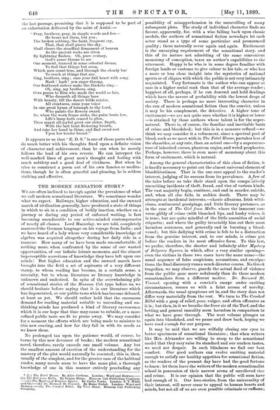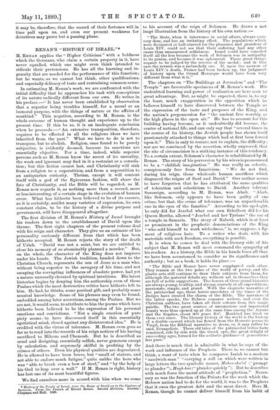THE MODERN SENSATION STORY.* WE are often inclined to inveigh
againt the prevalence of what we call modern sensational literature. We sometimes wonder what we expect. Railways, higher education, and the onward march of civilisation generally, have produced a state of things in which to sit in a condition of bodily inaction, whether on a journey or during any period of enforced waiting, is fast becoming unendurable to our active-minded contemporaries of nearly all classes. Lord Macaulay, we are told, completely mastered the German language on his voyage from India; and we have heard of a lady whose very considerable knowledge of algebra was acquired altogether during her daily ride in a tramcar. How many of us have been made uncomfortable, if nothing more, when confronted by the sense of our wasted -opportunities, of our infinite leisure moments, and the almost imperceptible accretions of knowledge they have left upon our minds ! But higher education and the onward march have brought into the field a set of aspirants of a very different stamp, to whom reading has become, in a certain sense, a necessity, but to whom literature or literary knowledge is unknown and undesired. In spite of the overwhelming pile of sensational stories of the Hansom Cab type before us, we should hesitate before saying that it is our literature which has degenerated, or our public taste which has become debased, at least as yet. We should rather hold that the enormous demand for reading material suitable to unreading and un- thinking minds has produced a kind of literary excrescence which it is our hope that time may cause to subside, or a more refined public taste see fit to prune away. We may consider for a moment the efforts which are being made to minister to this new craving, and how far they fall in with its needs as we know them.
No prolonged tax upon the patience would, of course, be borne by this new devourer of books ; the modern sensational novel, therefore, rarely exceeds one small volume. Any but the smallest amount of exertion of the understanding for the mastery of the plot would naturally be resented ; this is, then, usually of the simplest, and for the greater ease of the habitual reader, many novels seem to have the same plot, a thorough knowledge of one in this manner entirely precluding any --- * (1.) The Fatal House. By Alice Corkran. London Ward and Downey.— (2.) The Girl from Malta. By Fergus Hume. Hansom Cab Publishing Company. —(3 ) The Mystery of Belgrave Square. By Curtis Yorke. London: F. Y. White and Co.—(4.) Dr. Bernard St. Vsncent. By Hume Nisbet. London : Ward and Downey.—(5.) The Crooked Billet. By Vero Shaw. 'ransom Cab Publishing Company. possibility of misapprehension in the unravelling of many subsequent plots. The study of individual character finds no favour, apparently, for, with a wise falling back upon classic models, the authors of sensational fiction nowadays let each actor stand as a type of some particular and pronounced quality ; these naturally occur again and again. Excitement is the unvarying requirement of the sensational story, and this of its nature not admitting of the same convenient monotony of conception, taxes an author's capabilities to the uttermost. Happy is he who is in some degree familiar with foreign lands or customs to give colour to his tale, or who has a more or less close insight into the mysteries of national sports or of cliques with which the public is not very intimately acquainted. Very fortunate is the author who can appear at ease in a higher social rank than that of the average reader ; happiest of all, perhaps, if he can descend and hold dealings which have the savour of probability with the lowest dregs of society. There is perhaps no more interesting character in the run of modern sensational fiction than the convict, unless it may be his complement, the detective. A higher tone of excitement—we are not quite sure whether it is higher or lower —is attained by those authors whose talent is for the super- natural. There is, of course, the familiar and inevitable basis of crime and bloodshed; but this is in a measure refined—we think we may consider it a refinement, since a spectral pool of blood, such as we meet with in The Fatal House, partakes less of the shambles, at any rate, than an actual one—by a superstruc- ture of inherited curses, phantom orgies, and weird prophecies. Perhaps, however, there is even more of monotony about this form of excitement, which is natural.
Among the general characteristics of this class of fiction, it is hardly necessary to point out the almost universal element of bloodthirstiness. That is the one sure appeal to the reader's interest, judging of its success from its prevalence. A/ew of the tales before us take their stand upon the compaatively unexciting incidents of theft, fraud, and vice of various kinds. The vast majority begin, continue, and end in murder, suicide, and, when all else fails, in sudden death. There may be attempts at incidental interests,—classic allusions, Irish witti- cisms, sentimental gossipings, and little literary pretences, as in the case of The Girl from Malta, where the innocent con- verse glibly of crime (with blanched lips, and husky voices, it is true), but are quite mindful of the little amenities of social etiquette ; and where the guilty invariably hiss out their most harmless sentences, and generally end in bursting a blood- vessel ; but this dallying with crime is felt to be a distraction from the genuine interest, and, to our minds, is crime put before the readers in its most offensive form. To this last, we prefer, therefore, the shorter and infinitely abler Mystery of Belgrave Square, in which, after a very similar opening— even the victims in these two cases have the same name—the usual sequence of false suspicions, accusations, and exculpa- tions, the final discovery runs a much directer course. No Greek tragedian, we may observe, guards the actual deed of violence from the public gaze more sedulously than do these modern sensationalists front a different motive. Dr. Bernard St. Vincent, opening with a convict's escape under exciting circumstances, rouses us with a faint aroma of novelty. Afterwards, the usual symptoms set in, and the story does not differ very materially front the rest. We turn to The Crooked Billet with a gasp of relief, poor, vulgar, and often offensive as it is ; but then, in it we breathe the freer air of the Turf, and the betting and general rascality seem harmless in comparison to what we have gone through. The next volume plunges us again into bloodshed, and we pause and draw back, hoping we have read enough for our purpose.
It may be said that we are wilfully closing our eyes to better specimens of sensational literature ; that when writers like Mrs. Alexander are willing to stoop to the sensational model that they may raise its standard and our sunken tastes, we need not despair. In such blindness we find our best comfort. Our good authors can evolve exciting material enough to satisfy our healthy appetites for sensational fiction, as the readers of the present day have had the good fortune to learn : let them leave the writers of the modern sensationalist school in possession of their narrow arena of unrelieved vice and crime. It is our opinion that the public will soon have had enough of it. Our love-stories, from the universality of their interest, will never cease to appeal to human hearts and minds, but not all of us are even possible criminals or ruffians ;
it may be, therefore, that the record of their fortunes will in time pall upon us, and even our present weakness for detectives may prove but a passing phase.







































 Previous page
Previous page